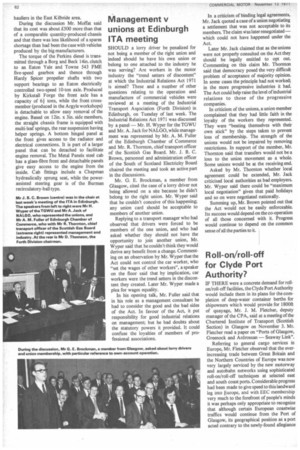Management v unions at Edinburgh ITA meeting
Page 64

If you've noticed an error in this article please click here to report it so we can fix it.
SHOULD a lorry driver be penalized for not being a member of the right union and indeed should he have his own union or belong to one attached to the industry he was serving? Are workers in the motor industry the "trend setters of discontent" at which the Industrial Relations Act 1971 is aimed? These and a number of other questions relating to the operation and manufacture of commercial vehicles were reviewed at a meeting of the Industrial Transport Association (Forth Division) in Edinburgh, on Tuesday of last week. The Industrial Relations Act 1971 was discussed by a panel — Mr. H. Wyper for the TGWU and Mr. A. Jack for NALGO, while management was represented by Mr. A. M. Fuller of the Edinburgh Chamber of Commerce and Mr. R. Thornton, chief transport officer of the Scottish Gas Board. Mr. J. B. C. Brown, personnel and administration officer of the South of Scotland Electricity Board chaired the meeting and took an active part in the discussions.
Mr. G. E. Brockman, a member from Glasgow, cited the case of a lorry driver not being allowed on a site because he didn't belong to the right union. Mr. Wyper said that he couldn't conceive of this happening; any union card should be acceptable to members of another union.
Replying to a transport manager who had observed that drivers were forced to be members of the one union, and who had asked whether they should not have the opportunity to join another union, Mr. Wyper said that he couldn't think they would derive any benefit from a change. Commenting on an observation by Mr. Wyper that the Act could not control the car worker, who "set the wages of other workers", a speaker on the floor said that by implication, car workers were the trend setters in the discontent they created. Later Mr. Wyper made a plea for wages equality.
In his opening talk, Mr. Fuller said that in his role as a management consultant he had to consider the good and the bad sides of the Act. In favour of the Act, it put responsibility for good industrial relations on management: but he had doubts about the statutory powers it provided. It could confuse the loyalties of members of professional associations. In a criticism of binding legal agreements, Mr. Jack quoted a case of a union negotiating a settlement that was not acceptable to its members. The claim was later renegotiated— which could not have happened under the Act.
Later Mr. Jack claimed that as the unions were not properly consulted on the Act they should be legally entitled to opt out. Commenting on this claim Mr. Thornton said that democracy posed the very difficult problem of acceptance of majority opinion. In some cases the principle had not worked; in the more progressive industries it had. The Act could help raise the level of industrial relations to those of the progressive companies.
In criticism of the unions, a union member complained that they had little faith in the loyalty of the workers they represented. They were "beating themselves with their own stick" by the steps taken to prevent loss of membership. The strength of the unions would not be impaired by removing restrictions. In support of the member, Mr. Thornton said that transfers would not be a loss to the union movement as a whole. Some unions would be at the receiving end.
Asked by Mr. Thornton whether local agreement could be extended, Mr. Jack criticised local authorities as bad employers. Mr. Wyper said there could be "maximum local negotiation" given that paid holidays and so on were negotiated nationally.
Summing up, Mr. Brown pointed out that the Act would not be easily enforceable. Its success would depend on the co-operation of all those concerned with it. Progress would continue to depend on the common sense of all the parties to it.










































































































































































































